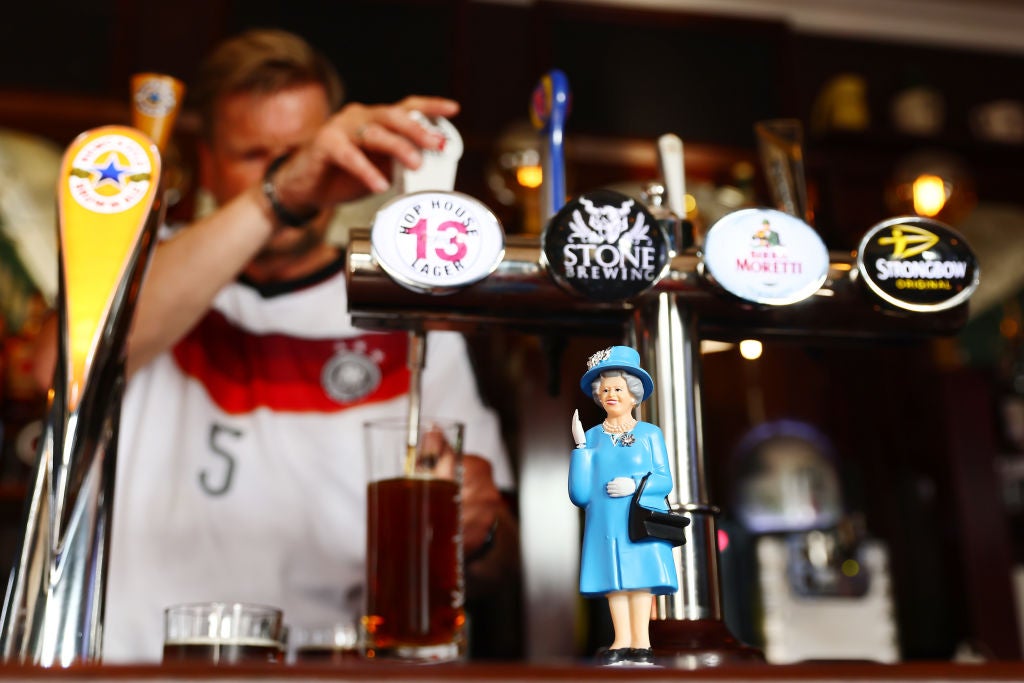Alcohol-related deaths are soaring – British drinking is out of control
Alcohol is the second leading cause of premature death, but our government still considers off-licences as important as pharmacies


Your support helps us to tell the story
From reproductive rights to climate change to Big Tech, The Independent is on the ground when the story is developing. Whether it's investigating the financials of Elon Musk's pro-Trump PAC or producing our latest documentary, 'The A Word', which shines a light on the American women fighting for reproductive rights, we know how important it is to parse out the facts from the messaging.
At such a critical moment in US history, we need reporters on the ground. Your donation allows us to keep sending journalists to speak to both sides of the story.
The Independent is trusted by Americans across the entire political spectrum. And unlike many other quality news outlets, we choose not to lock Americans out of our reporting and analysis with paywalls. We believe quality journalism should be available to everyone, paid for by those who can afford it.
Your support makes all the difference.Lurking in the background of the Covid pandemic has been our changing relationship with alcohol. Shedding light on this is new analysis from Public Health England, which makes for sobering reading.
One of the main findings is that there has been a staggering 20 per cent rise in alcohol-specific deaths during the year of the pandemic, mainly due to alcoholic liver disease. Demonstrating the sly nature of the way alcohol harms people, a time lag between drinking and health issues is materialising. On average, a decade elapses between drinking and when cirrhosis of the liver becomes evident. But we have not been living in average times – some of us have significantly upped the amount of alcohol we consume.
The 20 per cent rise in alcohol-specific deaths begins to make sense when you see that 58.6 per cent of people have increased their intake during the pandemic. This group reveals they are drinking more than 50 units of alcohol a week – the current cut off point used to identify a higher risk of harm. Fifty units is equivalent to 25 double gins or 25 cans of beer.
Although, on average, cirrhosis can take a decade to develop, the harm is accelerated when someone drinking excessively further increases their consumption. This explains the big jump in mortality due to alcohol.
While averages are useful, all they really give us is an idea of what is happening at a population level. It is the detail contained in this new report that provides some of the most critical insights. As with many aspects of health, harm from alcohol is not spread evenly in the population. North-east England had the most dramatic rise in alcohol-specific deaths with a jump of 79.7 per cent – more than the combined base rate of 2018 and 2019. More proof that where you live has a real effect on health, in terms of how long you will live and what will kill you.
Despite all the restrictions put in place during the pandemic, such as closing restaurants and bars for 31 weeks, there was no change in alcohol sales, as it appears some people simply moved their drinking to their home. Again, that is an overall view – what matters is the way this adaption has impacted those drinking the most.
We already know that drinking at home differs from drinking outside of the home in bars and restaurants. No one uses the accurate measures that bars use when pouring themselves a drink; and they are not constrained by closing times or the influence that drinking in a group has. Consequently, home drinking can be higher in both quantity and frequency. After all, it requires less effort than going out. The British Liver Trust provides an online quiz that can help identify if you are drinking at harmful levels.
Instead of recognising and responding to the fact that alcohol is now the second leading cause of premature death, the only government intervention has been to ensure access to alcohol during the pandemic. Exemplified by its move to place off-licences in the same category as pharmacies by deeming them “essential” services.
The recent report by Dame Carol Black investigating the state of specialist treatment services for drug use, including alcohol, was damning in its assessment of support available for those who develop problems. It did not deem the current state of treatment fit for purpose. Dame Carol rightly identified the economic and human cost of this failure, arguing that if the government chooses to continue cutting budgets for treatment, the taxpayer will be left paying the price.
But it's not just alcohol that is sly. The alcohol industry is adept at protecting its interests and has proved to be an effective persuader of not just this government but all those preceding it. It is no accident that alcohol is not only more available than it has ever been but also, relative to income, cheaper too. By influencing policy in its favour, the industry has flourished. Unfortunately, its most loyal and frequent customers have not.
Despite this horrific rise in alcohol-specific deaths, it’s unlikely that the measures needed to halt further premature deaths will be enacted by this government. Our leaders have an unhealthy relationship with an industry that pays lip service to protecting its consumers. Addressing this unhealthy relationship would have a significant effect on our collective relationship with alcohol.
Ian Hamilton lectures in mental health at the Department of Health Sciences, University of York
Join our commenting forum
Join thought-provoking conversations, follow other Independent readers and see their replies
Comments